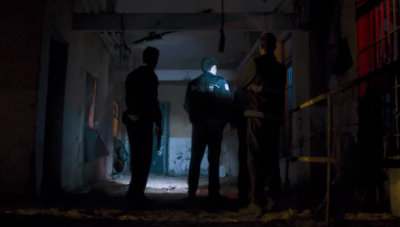Director: Can Evrenol
Year released: 2015
THE CHARGE: Serving up 31 frosty flavors... of TERROR.
THE EVIDENCE: Foreign horror films can make for interesting viewing. Sometimes it reveals universal themes that are frightening regardless of your nationality or background, like the extreme horror of the French films Martyrs and Inside. Sometimes it reveals unique motifs to specific to the culture of the film's origin, like the dark humor of the Israeli film Rabies or the socio-economic motives behind the violence in the Japanese film Dream Home. Baskin, filmed in Turkey, falls between those two ends of the spectrum, giving what seems to be a very local flavor to universally nightmarish concepts.
Baskin opens with a Tarantino-esque scene of several Turkish policemen at a diner, jokingly discussing strange topics like what percentage of Turkish men lose their virginity to animals. The scene establishes that these men are a fairly close-knit bunch who know each other well but it also makes the majority of them rather unlikeable, especially when one of them ends up in a fist fight with a bus boy.
One of the officers, Arda, is the youngster of the group and is carefully watched over by the group's captain due to a promise he made to Arda's parents before their death. While the rest of the group exchange crass jokes and friendly insults, Arda confides to his boss that he's been suffering from nightmares - the kind of nightmares where you think you wake up only to find that you're still in the dream.
As they leave the diner, the group gets a distress call on their radio from another unit in a nearby town. So they make their way to assist but find themselves in odd situations during their trip. A naked man rushes across the road ahead of them and when they pull over to find him, they find the road lined with hundreds of frogs and strange scratches suddenly appear on their police van. Later, they inadvertently run over someone who leaps in front of their van and, in the impact, they lose control and swerve into a small lake.
Despite these odd setbacks, the group gets to the location of the distress signal only to find a long-deserted building where an officer is repeatedly banging his bloody forehead against a wall. They try to help the nearly catatonic officer while splitting up to investigate the area, and are all captured or killed by members of a cult that has taken over the building.
The captured officers are chained to walls and the leader of the cult, a grotesque man simply known as "The Father", attempts to indoctrinate them. The ritual involves gouging out their eyes and forcing one of them to engage in sex with a masked cult member draped in animal skins, not unlike the procedure both Democrats and Republicans use to announce their presidential candidates. (I'm staunchly independent, in case you couldn't guess).
Arda, falling in and out of consciousness due to a combination of sleep deprivation and attacks from the cult members, eventually manages to escape. But without getting too heavily into spoiler territory, his earlier description of his nightmares comes back to haunt him.
Baskin certainly gets its horror elements right, creating a vividly nightmarish scenario for its characters. But ultimately, a lot of it rang hollow for me and I don't know if it's just because some of the elements presented are specific to Turkish culture. Take the road lined with frogs, for instance. It's certainly weird and unsettling but I don't get if it's supposed to be scary or just some unexplained dreamlike imagery.
And the movie's final act, where the captured policemen are forced to engage in the cult's rituals, really bogs down under its own weight. The movie tries to present a frightening but potentially realistic scenario, but there's never any explanation provided for what the cult is, why it exists, or why so many people would willingly have their eyes plucked out to become members of the cult. So the final act just presents us with a lot of strange visuals with little explanation. While I can see the point of presenting things in such a fashion to intensify the nightmarish quality of the proceedings, it left me trying to figure out a lot of questions that distracted me from being swept up by the horror.
I want to like Baskin. I really do. Director Can Evrenol clearly took a chance and tried to do something different with his film and the screenplay is actually quite smart, frequently folding in on itself through extensive use of callbacks and foreshadowing. But I was never really invested in the film, and what should have been a nightmare ends up being merely a curiosity.
THE VERDICT: Baskin is GUILTY of falling short of its goals but let go with a warning, since this judge would like to see if Evrenol can improve on his work in future projects.



